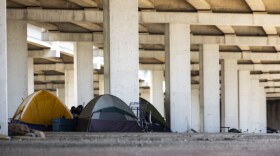The Other Ones Foundation is raising money to build temporary shelters for Austinites living at Camp Esperanza, the state-sanctioned campsite opened last year for people experiencing homelessness.
The semi-permanent shelters can last 10 years, have electrical connectivity, heating and A/C. The units, which can measure either 64- or 100-square-feet, are quickly assembled and feature lockable doors. They're manufactured by Washington-based Pallet.
The Other Ones Foundation kicked off a capital campaign Tuesday to raise $2 million for 200 units for either couples or single residents at the site, which was opened by Gov. Greg Abbott in response to the city's handling of homelessness.
Of the roughly 150 people who live at the site off U.S. Highway 183 in Southeast Austin, the vast majority lives in tents. Chris Baker, executive director of The Other Ones, says that presents a couple of problems. For one, tents aren't designed for everyday wear-and-tear. While a housed person may own a tent that lasts years, that's because they use it only a couple times a year. That's a fraction of use compared to someone sleeping outdoors in a tent every day.

Tents also aren't very secure. Residents living in the Pallet homes can worry less about theft of their belongings or even the tent itself.
Perhaps most importantly, Baker says, the tiny homes mean people living out at Camp Esperanza have a stable roof over their heads, taking them out of what he calls "crisis mode."
"These are at least an option to get people inside," Baker said Tuesday. "Trying to help people get up off the streets is made tremendously more difficult by the fact that they are in a constant state of trying to keep their shelter intact and trying to keep their basic needs being met."
Baker says he knows the ask is steep, but it's relatively cheap compared to other options – namely brick-and-mortar housing.
Last November, Abbott and the Austin Chamber of Commerce and the Downtown Austin Alliance touted a plan to raise $14 million to operate a 300-bed temporary shelter on the site, but those plans didn't materialize.
Pallet's 64-square-foot units cost nearly $5,000, while 100-square-foot units cost $7,000. Baker says that's a fraction of what other manufacturers have quoted him over the past year or so. On top of that, Pallets homes have been rolled out successfully across the country.
Baker admits the homes aren't a panacea for those living outdoors at the site, but it's a step toward housing for many. In the past year, The Other Ones has provided medical and mental health services to folks staying at the camp, and the Austin nonprofit is finishing up a community kitchen, with plans to construct a general store out of a shipping crate.
Baker says he hopes the homes will further inspire a sense of community.
"This is not a permanent solution to all the damage that has been done to someone. My brothers and sisters out here are still going to have all that same trauma deep in their hearts and souls, and they're still going to have all the sort of same deep-rooted distrusts of systems and all that kind of stuff," he said. "They've been failed again and again and again, and that's not going to go away because we put up some Pallet shelters, you know what I mean? But it is a really f------ good first step."
Baker says The Other Ones plans to erect the shelters within 90 days, if they meet their fundraising goal. After that, they'll run sewage and electricity lines into the camp.
Got a tip? Email Andrew Weber at aweber@kut.org. Follow him on Twitter @England_Weber.
If you found the reporting above valuable, please consider making a donation to support it. Your gift pays for everything you find on KUT.org. Thanks for donating today.








